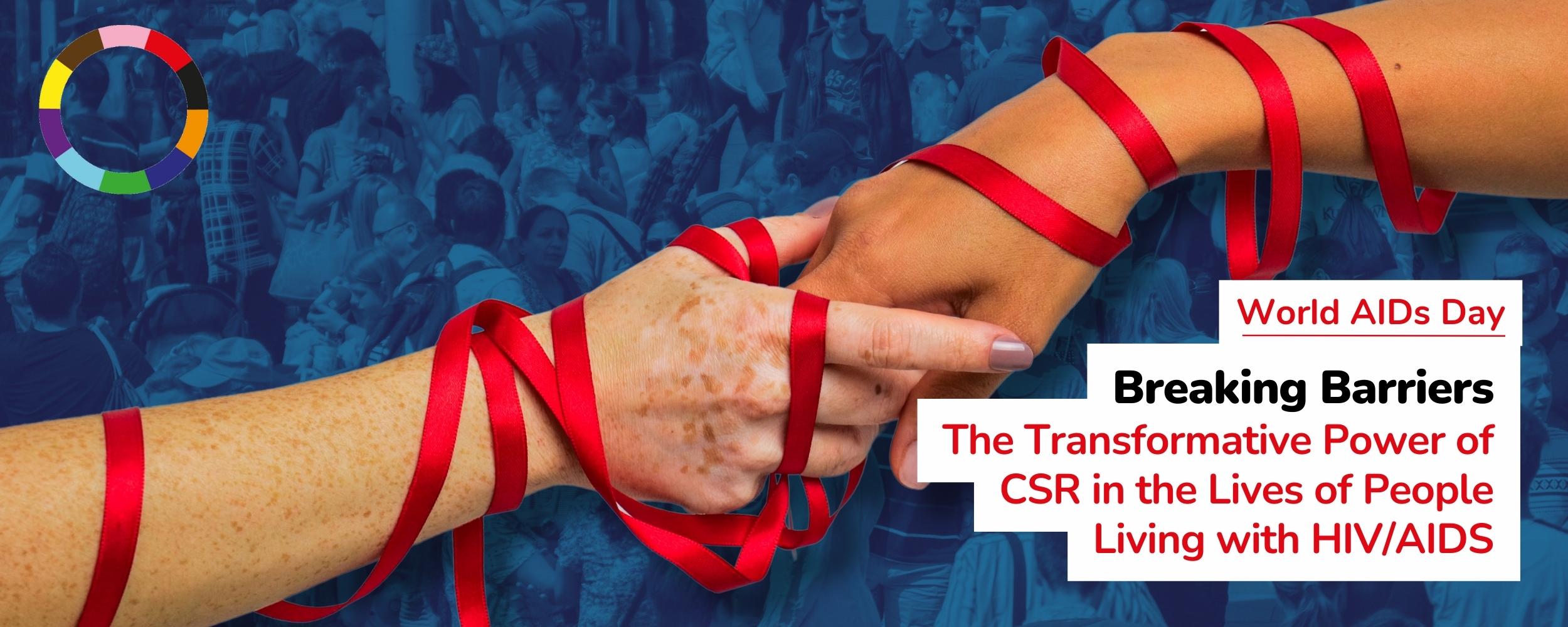World Aids Day: The Power of Corporate Social Responsibility

This World Aids Day 2023, LGBT Great reflects on the transformative power of CSR initiatives in improving outcomes, boosting awareness and reducing stigma for those living with HIV. We hope that the 5 key strategic recommendations discussed below, inspire organisations to take a more proactive CSR approach to empower and support communities living with HIV.
They say some years change the course of history forever. 1981 was one of those years, when HIV (human immunodeficiency virus) was first diagnosed and identified in humans. Since then, more than 35 million people in the world have died due to the disease and an estimated 38 million people currently live with the virus, numbers devastating enough for it to be called “one of the most destructive pandemics in history”.
Around three decades before the emergence of HIV, the aftermath of World War II saw a surge in economic prosperity in the western world. In an attempt to formalise and synthesise philanthropic principles that businesses could adopt to have a positive impact on society (given their growing influence and power), an American economist by the name of Howard Bowen, coined the term ‘Corporate Social Responsibility’ or more commonly known as CSR. This concept urged organisations to play an active role in contributing to societal prosperity by making it a business imperative, instead of just an ethical choice.
Fast-forward to the 21st century, CSR has now become a norm rather than a utopic ideal, with its focus on three core elements- environmental, social, and governance, or more commonly known as ESG. At the same time, humanity’s fight against HIV has garnered unprecedented success. With proper medical care, people living with HIV can live long and healthy lives while protecting their partners with almost no risk of transmission.
Even though the progress for both causes has been exceptional, there persists an engagement gap between CSR policies and organisational efforts which are explicitly focused on supporting communities living with HIV. Below, LGBT Great lists 5 ways to bridge this disconnect and reform CSR efforts in order to empower communities living with HIV.
- Workplace Programs and Initiatives: This is a common and effective CSR approach where companies internally allocate and deploy resources for employee training and knowledge-sharing in order to boost awareness around HIV. Much like anti-racist or LGBTQ+-inclusive awareness sessions, these initiatives can foster psychologically safe spaces for employees living with HIV. Here is a free educational resource curated by UNAIDS that LGBT Great encourages you to read and share- Evidence for eliminating HIV-related stigma and discrimination
- Strategic Funding: Financial services companies and broader business, equipped with resources and financial expertise, can provide strategic funding to non-profits focused on HIV. By aligning financial goals with organisational missions, partnerships can amplify the impact of community programs, ensuring sustainable and effective solutions that benefit communities living with HIV.
- Leveraging Marketing Power: Organisations can affect change using their platform and expertise, influence and reach to create public health partnerships, as documented in MTV’s global HIV/AIDS program famously known as ‘Staying Alive’, which reached over 166 countries and achieved proven results in promoting interpersonal communication and influencing young people's beliefs about HIV prevention in a positive manner.
- Healthcare Policies: Creating healthcare benefits and policies which cover all needs and requirements of people living with HIV remains of utmost importance. By providing access to holistic medical care, organisations can mitigate health risks for their employees living with HIV. A healthier workforce is also a more productive workforce, enabling organisations to unlock the true potential of their employees.
- Advocacy and Thought Leadership: There is a dearth of pertinent data around 1) workplace experiences of people living with HIV and 2) the impact of CSR efforts on individuals living with HIV. Organisations should invest in thought leadership and research partnerships that enable data-led insights to subsequently inform best-practice in the workplace.
By incorporating these strategies, organisations can fulfil CSR commitments while playing a transformative role in empowering communities living with HIV. Progress lies in closing the engagement gap and fostering a future where communities living with HIV are celebrated and uplifted instead of being stigmatised and discriminated.
To conclude, LGBT Great would like to highlight a bespoke quote which was provided to us by the brilliant Bisi Alimi who is an executive coach, public speaker, storyteller, television pundit, campaigner, writer, actor and social entrepreneur, and calls himself the “angelic troublemaker”.
"Despite the advancement and achievement in HIV prevention and treatment and with the amount of knowledge we have about the virus, it is deeply saddening to know that in this century, there are still workplaces that refuse employment opportunities to people living with HIV, or dismiss people on the premise of being positive and to think this is done with clarity and support. We cannot continue to talk about reducing HIV infection if we keep sending people into poverty because of their HIV status."
To advance the conversation in your organisation, please contact us:
Written by Shreyas Dutta
